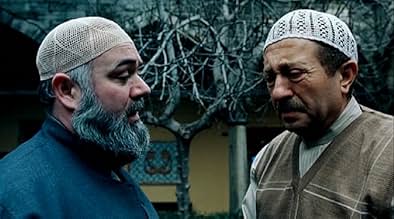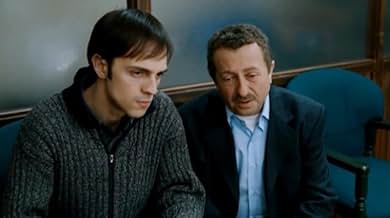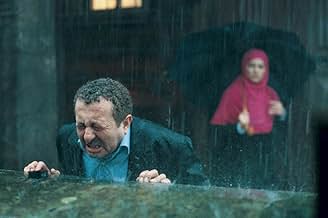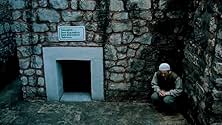A promotion brings a Muslim's relationship with God into question.A promotion brings a Muslim's relationship with God into question.A promotion brings a Muslim's relationship with God into question.
- Awards
- 19 wins & 15 nominations total
- Director
- Writer
- All cast & crew
- Production, box office & more at IMDbPro
Featured reviews
This is a rare example of an inner look at the Islamic sects and their organizations. Although the movie is a fiction, at times you may think you are watching a documentary of a Turkish Islamic sect and its rituals.
Tha main character, Muharrem is a devout and simple believer and a follower of the sect. He gets selected by his Efendi (sheikh of the sect) for collecting the rent money of the sect. This purely financial act affects Muharrem morally and psychologically.
Erkan Can plays an excellent Muharrem. Guven Kirac (Rauf the vice sheikh) and Meray Ulgen (the sheikh) are very very believable in their roles.
This probably one of the finest examples of the new Turkish cinema.
Tha main character, Muharrem is a devout and simple believer and a follower of the sect. He gets selected by his Efendi (sheikh of the sect) for collecting the rent money of the sect. This purely financial act affects Muharrem morally and psychologically.
Erkan Can plays an excellent Muharrem. Guven Kirac (Rauf the vice sheikh) and Meray Ulgen (the sheikh) are very very believable in their roles.
This probably one of the finest examples of the new Turkish cinema.
I think it goes much to far to call this excellent film a documentary about the life of a Muslim sect or a critique of political Islam or even the role of the religious orders in Turkish economic life. Rather I would like to claim that it gives just an impression of the life Turkish religious orders, society and the mind of a devout religious man who previously led a uncritical life without real challenges and without deep thoughts about practical life and religion. Therefor he's unprepared for both of it.
I would guess that one could find his "state of mind" also with a range of uncritical believers of many religions who, although ardently believe stay shallow in their intellectual penetration of their believe and worldly life. They stay rather caught in conservative dogmas, which where made to control man and are far away from a healthy human experience.
Not everything shown in Film should be taken at face value. The depiction of the ritual life gives an impression of the ecstatic quality of such gatherings but is exaggerated in their frenetic appearance. There may have been reasons for this depiction but one should rather try not to confuse it with the an authentic account; this account one should rather get in contact with real orders.
The protagonist has high values which he fails to satisfy. This puts him in a moral dilemma which is very instructively set in contrast on one hand to worldly every day people and merchants with their cheating and accommodation with an imperfect world. On the other there is a religious order, which although is directed towards spirituality is of course also involved in worldly enterprises and has of course it financial interests. Nothing gets euphemised but the problems of both - profane and spiritual - get expounded in a way that a psychological profile of shallow but devote believer meets social criticism (not only hitting the Turkish Islamic milieu of its setting but also similar ones in other regions and religions).
I would guess that one could find his "state of mind" also with a range of uncritical believers of many religions who, although ardently believe stay shallow in their intellectual penetration of their believe and worldly life. They stay rather caught in conservative dogmas, which where made to control man and are far away from a healthy human experience.
Not everything shown in Film should be taken at face value. The depiction of the ritual life gives an impression of the ecstatic quality of such gatherings but is exaggerated in their frenetic appearance. There may have been reasons for this depiction but one should rather try not to confuse it with the an authentic account; this account one should rather get in contact with real orders.
The protagonist has high values which he fails to satisfy. This puts him in a moral dilemma which is very instructively set in contrast on one hand to worldly every day people and merchants with their cheating and accommodation with an imperfect world. On the other there is a religious order, which although is directed towards spirituality is of course also involved in worldly enterprises and has of course it financial interests. Nothing gets euphemised but the problems of both - profane and spiritual - get expounded in a way that a psychological profile of shallow but devote believer meets social criticism (not only hitting the Turkish Islamic milieu of its setting but also similar ones in other regions and religions).
Takva - A Man's Fear of God is one of those films that playfully enact conflicts of fundamental importance for the world we live in. Takva starts off with humble Muharrem, an introverted single man living in Istanbul, being drawn into the inner circle of a Muslim brotherhood he has adhered to ever since his childhood days. When the erudite and strikingly pragmatic leader, Sheikh Cemal, appoints him as his financial organizer, Muharrem gets endowed with all the amenities and trappings of a modern world businessman. He has to collect rent and administer the order's finances. His naive will to live a life according to what he thinks is the will of God clashes not only with his unfulfilled sexual desires, but also with the mechanisms of power within the order. The brothers' lifestyle may be conservative, but they run an organization that is fully intertwined with the present day social, political and economic life of Turkey.
For Muharrem, who hardly understands any of this business, this means that every step he intends to make for the greater glory of God draws him ever deeper into the quagmire of corruption, lies and hypocrisy. The authority he is endowed with now makes him haughty and difficult to deal with, while his accumulated frustration increasingly throws him into literal fits. Everything escalates when he comes face to face with the woman he desires...
The plot for this great film is based on an old folk tale from Turkey about a man who refuses to marry the daughter of his spiritual master although he clearly loves her. In Onder Cakar and Omer Kiziltan's adaptation, the narrative serves to expose the inner mechanisms of puritan Muslim orders and throw light on the mental set-up of its loyal members. The film is pure fun to watch due to countless instances of great irony, a remarkable love for detail and breathtaking scenes of ecstatic rituals. While the filmmakers were very careful not to ridicule the milieu they're depicting, their critical approach accounts for a film that substantially helps understand the way political Islam "works".
For Muharrem, who hardly understands any of this business, this means that every step he intends to make for the greater glory of God draws him ever deeper into the quagmire of corruption, lies and hypocrisy. The authority he is endowed with now makes him haughty and difficult to deal with, while his accumulated frustration increasingly throws him into literal fits. Everything escalates when he comes face to face with the woman he desires...
The plot for this great film is based on an old folk tale from Turkey about a man who refuses to marry the daughter of his spiritual master although he clearly loves her. In Onder Cakar and Omer Kiziltan's adaptation, the narrative serves to expose the inner mechanisms of puritan Muslim orders and throw light on the mental set-up of its loyal members. The film is pure fun to watch due to countless instances of great irony, a remarkable love for detail and breathtaking scenes of ecstatic rituals. While the filmmakers were very careful not to ridicule the milieu they're depicting, their critical approach accounts for a film that substantially helps understand the way political Islam "works".
The film is about a devoted man to God and his rise in a Way of Islamic society. The film focuses on an ordinary man's Islamic life to his interference with money affairs and the results of it. The psychological state of the man is analyzed from sociological way as well.
The film is great from two main aspects. The first aspect is Erkan Can's wonderful role play. Enormous acting performance. Just unbelievable. The other great side is, the film is shot at real historical places of Istanbul.
The only weakness of the film is the end part of it. The enormous entrance the psychological and sociological perfectness in the beginning was not given in as good as beginning.
Moreover as a philosopher I would like to comment that this film gives a side of Islamica philosophy both its sociology.
The film is great from two main aspects. The first aspect is Erkan Can's wonderful role play. Enormous acting performance. Just unbelievable. The other great side is, the film is shot at real historical places of Istanbul.
The only weakness of the film is the end part of it. The enormous entrance the psychological and sociological perfectness in the beginning was not given in as good as beginning.
Moreover as a philosopher I would like to comment that this film gives a side of Islamica philosophy both its sociology.
... seems to be the question at the heart of this Turkish film about a simple man living a simple life until his world is turned upside down when he is suddenly exposed to the modern world in the service of his religion. Muharrem is at the center of this character study. He is a very nondescript looking man of about 40 who has been in the service of sack dealer Ali Bey and his family since childhood. He is called an apprentice, but he acts basically as a stock boy and runner of errands. He has been stuck at this point since he was a child with no hope of being more than he is, and he seems fine with that. He lives a simple life in simple quarters and rigidly adheres to his religious sect's rules without question.
What changes everything is when the leader of his religious sect selects Muhareem to be the organizer of finances for the group. With absolutely no training in this area and no prior exposure to the modern world and culture, he is thrust into a position of authority wandering about town collecting the sect's rents. When he is handed a cell phone to call Rauf - his superior and adviser - in case he has questions during his rounds, he looks as though he has been handed a piece of biomedical equipment that he must somehow assemble.
Muhareem finds himself morally challenged and psychologically troubled when he is exposed for the first time to power, money, and sex. The power comes in the form of regard that he's never had before from people who have previously treated him as though he was invisible. His new sexual temptations come in the form of things as simple as having to walk past a long line of female mannequins dressed in lingerie on his way to collect some rent moneys. Muhareem has never seen such sights before, and soon he is having disturbing dreams. Also, he begins to see an equally troubling change in his own personality that seems to be required for him to do his new job correctly, but goes against the grain of all he has ever believed to be righteous.
This film is set in Turkey and the sect in question is the Sufi branch of Islam, but it could easily be set anywhere in the world and involve any religion - the themes are universal. Highly recommended.
What changes everything is when the leader of his religious sect selects Muhareem to be the organizer of finances for the group. With absolutely no training in this area and no prior exposure to the modern world and culture, he is thrust into a position of authority wandering about town collecting the sect's rents. When he is handed a cell phone to call Rauf - his superior and adviser - in case he has questions during his rounds, he looks as though he has been handed a piece of biomedical equipment that he must somehow assemble.
Muhareem finds himself morally challenged and psychologically troubled when he is exposed for the first time to power, money, and sex. The power comes in the form of regard that he's never had before from people who have previously treated him as though he was invisible. His new sexual temptations come in the form of things as simple as having to walk past a long line of female mannequins dressed in lingerie on his way to collect some rent moneys. Muhareem has never seen such sights before, and soon he is having disturbing dreams. Also, he begins to see an equally troubling change in his own personality that seems to be required for him to do his new job correctly, but goes against the grain of all he has ever believed to be righteous.
This film is set in Turkey and the sect in question is the Sufi branch of Islam, but it could easily be set anywhere in the world and involve any religion - the themes are universal. Highly recommended.
Did you know
- TriviaTurkey's Official Submission to the Best Foreign Language Film Category of the 80th Annual Academy Awards (2008).
- How long is Takva: A Man's Fear of God?Powered by Alexa
Details
- Release date
- Countries of origin
- Official site
- Language
- Also known as
- Takva, l'homme qui craint dieu
- Filming locations
- Production companies
- See more company credits at IMDbPro
Box office
- Gross worldwide
- $2,040,826
- Runtime
- 1h 36m(96 min)
- Color
- Sound mix
- Aspect ratio
- 1.85 : 1
Contribute to this page
Suggest an edit or add missing content
























